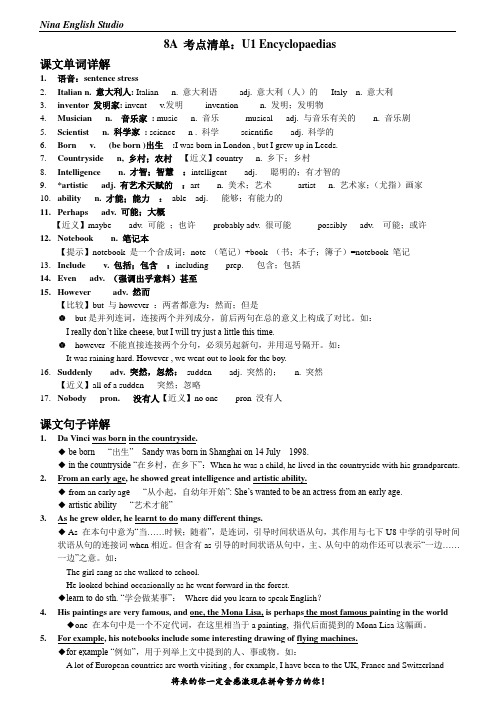8A-U1Encyclopaedias -grammar
【考点清单】 8A U1 Encyclopaedias

8A 考点清单:U1 Encyclopaedias课文单词详解1.语音:sentence stress2.Italian n. 意大利人: Italian n. 意大利语adj. 意大利(人)的Italy n. 意大利3.inventor 发明家: invent v.发明invention n. 发明;发明物4.Musician n. 音乐家: music n. 音乐musical adj. 与音乐有关的n. 音乐剧5.Scientist n. 科学家: science n . 科学scientific adj. 科学的6.Born v. (be born )出生:I was born in London , but I grew up in Leeds.7.Countryside n, 乡村;农村【近义】country n. 乡下;乡村8.Intelligence n. 才智;智慧:intelligent adj. 聪明的;有才智的9.*artistic adj. 有艺术天赋的:art n. 美术;艺术artist n. 艺术家;(尤指)画家10.ability n. 才能;能力:able adj. 能够;有能力的11.Perhaps adv. 可能;大概【近义】maybe adv. 可能;也许probably adv. 很可能possibly adv. 可能;或许12.Notebook n. 笔记本【提示】notebook 是一个合成词:note (笔记)+book (书;本子;簿子)=notebook 笔记13.Include v. 包括;包含:including prep. 包含;包括14.Even adv. (强调出乎意料)甚至15.However adv. 然而【比较】but 与however :两者都意为:然而;但是but是并列连词,连接两个并列成分,前后两句在总的意义上构成了对比。
- 1、下载文档前请自行甄别文档内容的完整性,平台不提供额外的编辑、内容补充、找答案等附加服务。
- 2、"仅部分预览"的文档,不可在线预览部分如存在完整性等问题,可反馈申请退款(可完整预览的文档不适用该条件!)。
- 3、如文档侵犯您的权益,请联系客服反馈,我们会尽快为您处理(人工客服工作时间:9:00-18:30)。
4ow?
S1: Is there anybody by the window ? S2: Yes, there's somebody by the window.
5.Is there anything under the teacher's desk?
coffee
eggs
Mum: Do we have any coffee?
Wendy: Yes,we have some coffee. Mum: Do we have any eggs?
Wendy: No, we don't have any eggs.
milk
noodles
Mum: Do we have any milk?
Wendy: Yes,we have some milk. Mum: Do we have any noodles?
Wendy: No, we don't have any noodles.
orange juice
potatoes
Mum: Do we have any orange juice?
Wendy: Yes,we have some orange juice. Mum: Do we have any potatoes?
Somebody, anybody,nobody etc. are singular. There is somebody in the room. There is not anybody in the room There is nobody in the room. Somebody is here. Is anybody here? Nobody is here.
Unit1 Encyclopaedias
Grammar
A. some and any
We use some and any to talk about amounts.
I have some questions about dinosaurs. She does not have any questions about dinosaurs. Do they have any questions about dinosaurs? Yes, they have some questions about dinosaurs.
S1: Is there anyone behind the teacher? S2: Yes, there's someone behind the teacher.
7.Is there anything on the bookcase?
S1: Is there anything on the bookcase? S2: No, there's something on the bookcase.
B. somebody and anybody,nobody,etc. We usually use (some-/ any-) in positive statements.We usually use (some-/ any-) in negative statements and questions . I saw somebody/someone/something. I did not see anybody/anyone/anything. Did you see anybody/anyone/anything? I saw nobody/no one/nothing.
S1: Is there anything on the noticeboard? S2: Yes, there's something on the noticeboard.
3.Is there anything above the teacher?
S1: Is there anything above the teacher? S2: No, there's nothing/there isn't anything above the teacher.
somebody= someone anybody= anyone no one nobody= I saw somebody/someone. I did not see anybody/anyone. Did you see anybody/anyone? I saw nobody/no one.
S1: Is there anything under the teacher's desk? S2: No, there's nothing/there isn't anything under the the teacher's desk.
6.Is there anyone behind the teacher?
Would you like some tea
?
Shopping list apples bread milk coffee eggs potatoes noddles orange juice Mum: Do we have any apples? Wendy: Yes,we have some apples. Mum:Do we have any bread? Wendy: No, we don't have any bread.
We can form negative statements in two ways There is not anybody in the room. There is nobody in the room.
We write no one as two words
I saw nobody/no one/nothing.
I have some milk to drink.
She doesn't any milk to drink.
We usually use (some/ any) in positive statements.We usually use (some/ any) in negative statements and questions .
We use some and any before (plural/singular) countable nouns and uncountable nouns.
I have some questions about dinosaurs.
She does not have any questions about dinosaurs.
1.Is there anything on the blackboard?
S1: Is there anything on the blackboard? S2: No, there's nothing/there isn't anything on the blackboard.
2.Is there anything on the noticeboard?
8.Is there anyone next to the piano?
S1: Is there anyone next to the piano? S2: Yes, there's someone next to the piano.
I have some questions about dinosaurs.
She does not have any questions about dinosaurs.
I have some milk to drink.
She doesn't any milk to drink.
We also use some in questions when we expect the answer to be "yes".. May I have some noodles ?
Wendy: No, we don't have any potatoes.
Hi Dad, I checked the fridge with Mum. We have _____________, ______________, ______________and _______________. However, we don't have ___________,_____________, __________________or __________________.
